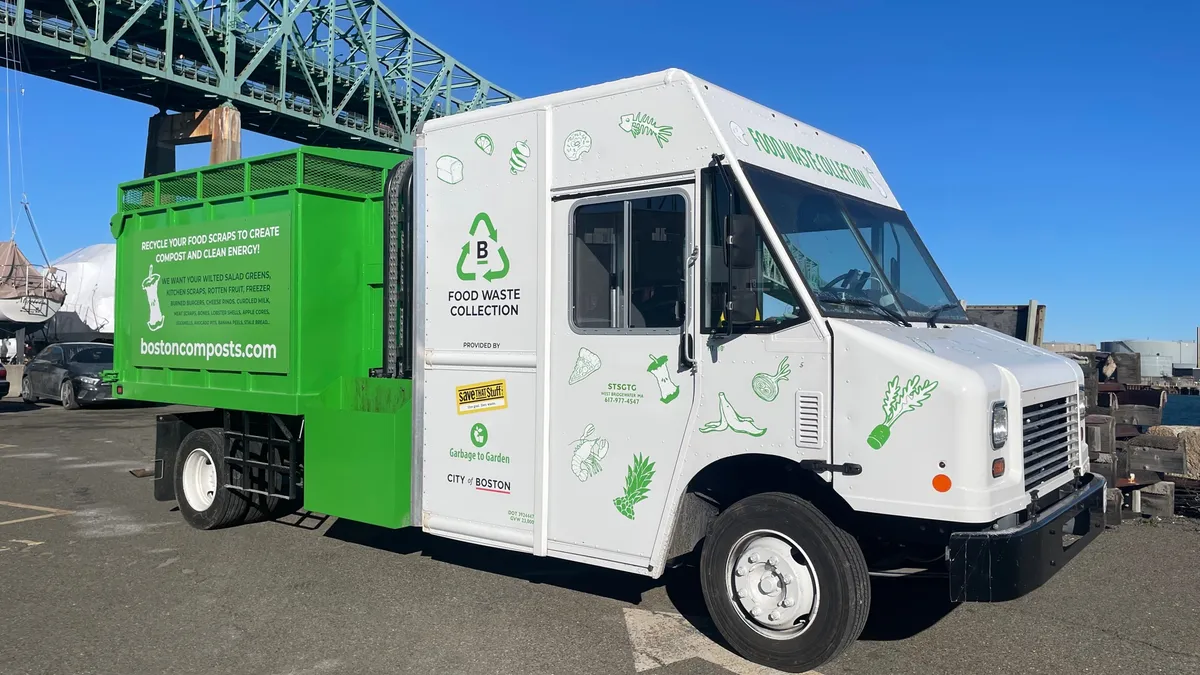Dive Brief:
- Boston Mayor Michelle Wu recently touted how the city’s food scrap collection program has collected more than 500 tons since August. Boston Public Works reports growth in monthly volumes since the program launched last summer.
- Collection across the initial group of 10,000 households is handled through a joint venture between Save That Stuff and Garbage to Garden. Boston pays $10.99 per household each month, plus a one-time cost of $32 per household for startup kits including bins, kitchen pails and educational material.
- The city plans to add 10,000 new households this summer, including a pilot that would be available to Boston Housing Authority residents in a specific neighborhood. Dennis Roache, superintendent of waste reduction at Boston Public Works, said an estimated 6,500 people have already expressed interest.
Dive Insight:
Boston set a goal in 2019 to achieve an 80% recycling rate by 2035 and organics collection was a key focus. The pandemic delayed progress on a concept for the city to subsidize a portion of service costs, before Wu’s administration advanced a plan to cover all costs for participants last year.
Participating residents received bins last August, and Roache said material quality has been very good.
"I think people that participate in this type of program, they really want to participate,” he said. “They're kind of early movers, early adopters, so they take it very seriously."
Annika Schmidt, marketing director for Maine-based Garbage to Garden, said the overall retention rate has been “phenomenal,” with an estimated 97% to 98% of original participants still active.
Garbage to Garden offers subscription service in some surrounding communities, and Save That Stuff collects organics for commercial customers, but neither company had a residential organics presence in Boston.
In their joint venture, Save That Stuff hosts the trucks and handles maintenance at its Boston location; Garbage to Garden handles back office support, routing technology and customer signups. While the former company uses rear-loaders, and the latter runs pickup trucks with cargo trailers, the two took a different approach for this program. They purchased six vans typically used for last-mile package delivery, cut the backs off and built custom bodies that could handle tipping 11-gallon carts. Finding ways to avoid drivers stepping out into traffic, and making the one-person operation efficient, were important considerations.
"It's not like we're picking up every household in a particular zone. We're doing a fair amount of traveling between the stops, so we just wanted to maximize the number of footsteps that enabled the driver to get safely in and out of the truck,” said Erik Levy, founder and president of Save That Stuff.
Another benefit is that employees don’t need commercial driver’s licenses. The companies currently provide service five days per week, with five vehicles on the road and one as a backup. Existing routes have the capacity to handle more stops during a normal workday, so depending on where the new accounts come from the companies may gain more route density.
“We're hoping that a lot of these people have seen bins in their neighborhood and they want to add,” said Levy.
Schmidt said the city has also been prioritizing service availability for areas with lower recycling rates, as well as for environmental justice communities, so that participating customers are “representative of the demographics throughout Boston."
Roache said monthly costs for the next round of customers will shift from $10.99 per household to $10.49, but further savings could occur as the program scales.
Access to processing infrastructure could also be a future cost factor. A consultant is finalizing a report about potential locations for new organics processing capacity within the city, which Roache said could be publicly or privately operated.
In the meantime, material goes to a WM pre-processing site in Boston and is sent to a regional wastewater treatment plant for codigestion. Save That Stuff will eventually handle some material at its regional aerated static pile composting site, which will also have pre-processing capabilities. That site accepted leaf and yard waste last year, but won’t be ready for food waste until permitting is complete.
Boston currently collects yard waste separately, on a seasonal basis, but Roache said it’s possible the curbside program could eventually have commingled collection like other cities. He expects ongoing innovation within the region could affect costs, but said the Wu administration is also focused on broader environmental and quality-of-life benefits.
“You're going to have a cleaner city, you're going to have less rats,” he said. "I think in the next five to 10 years, everybody's going to have to start to do this.”













